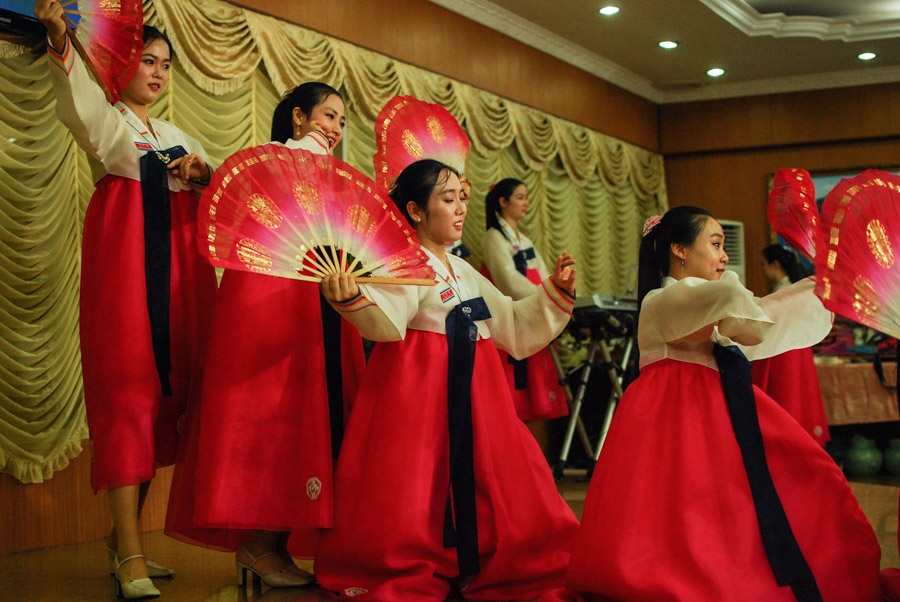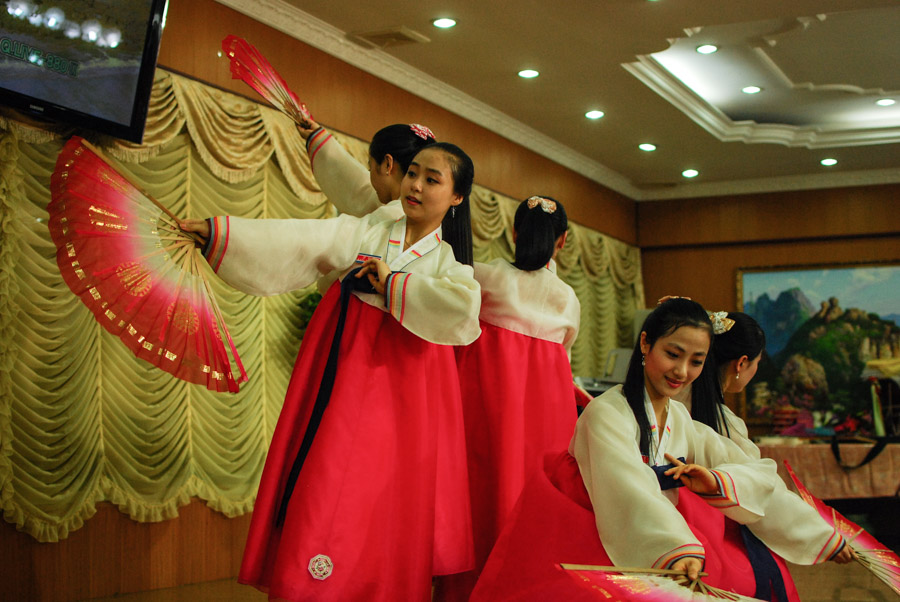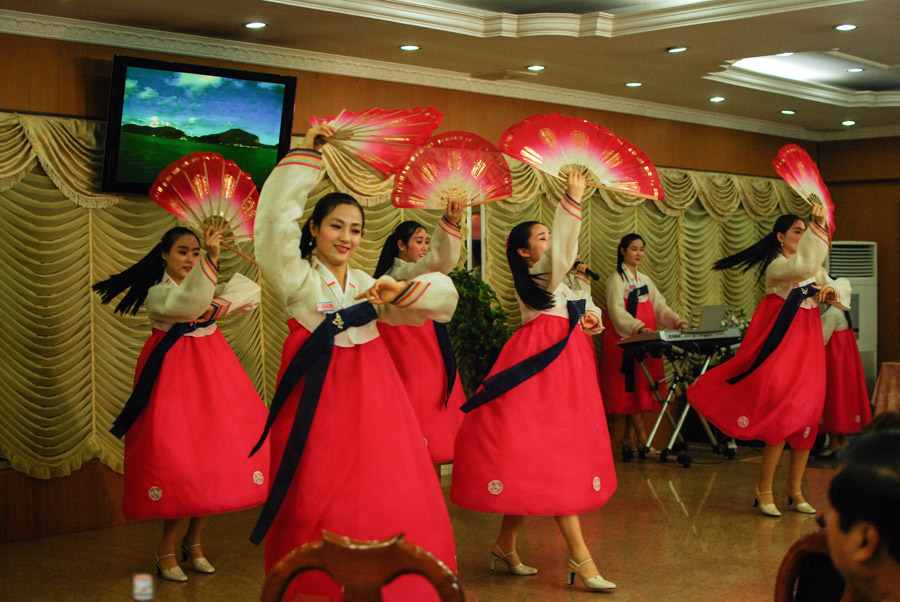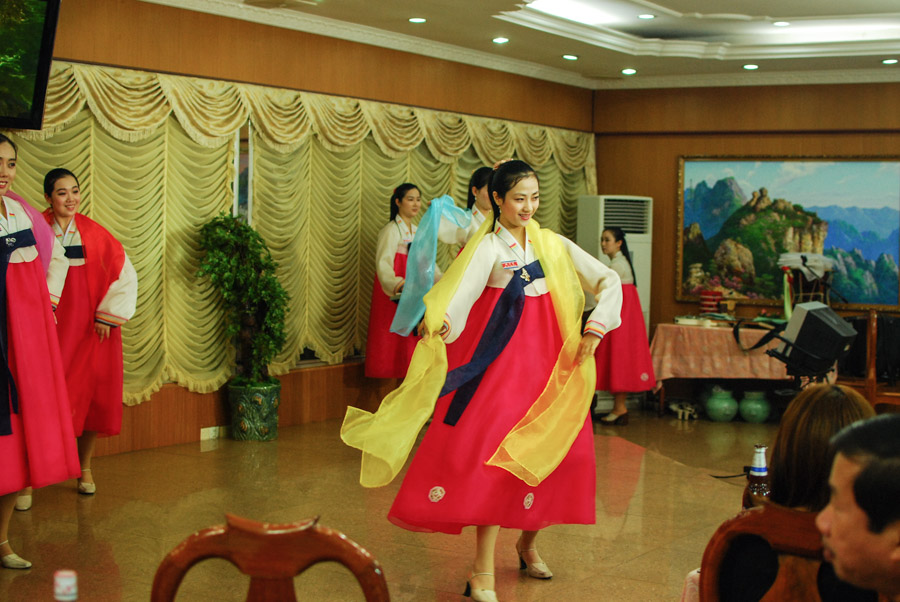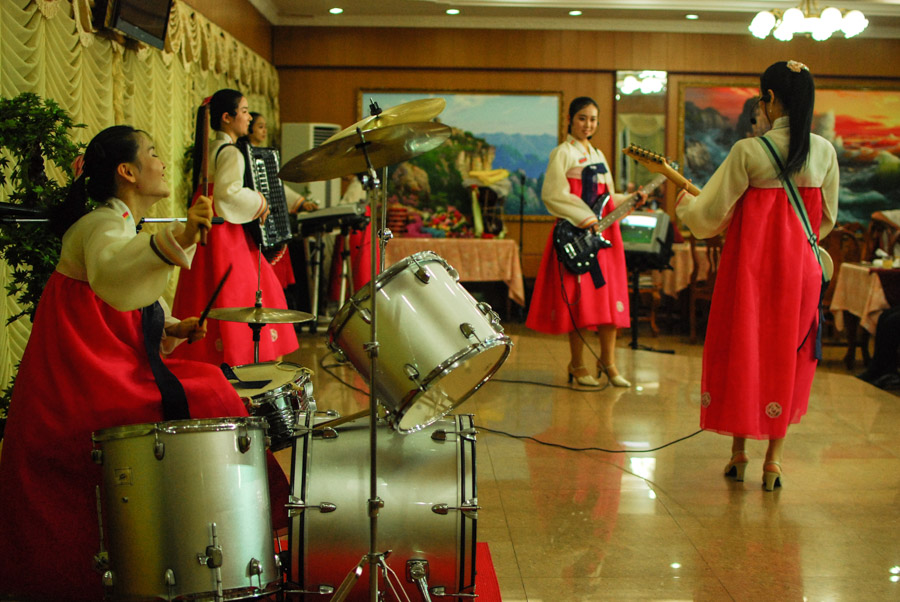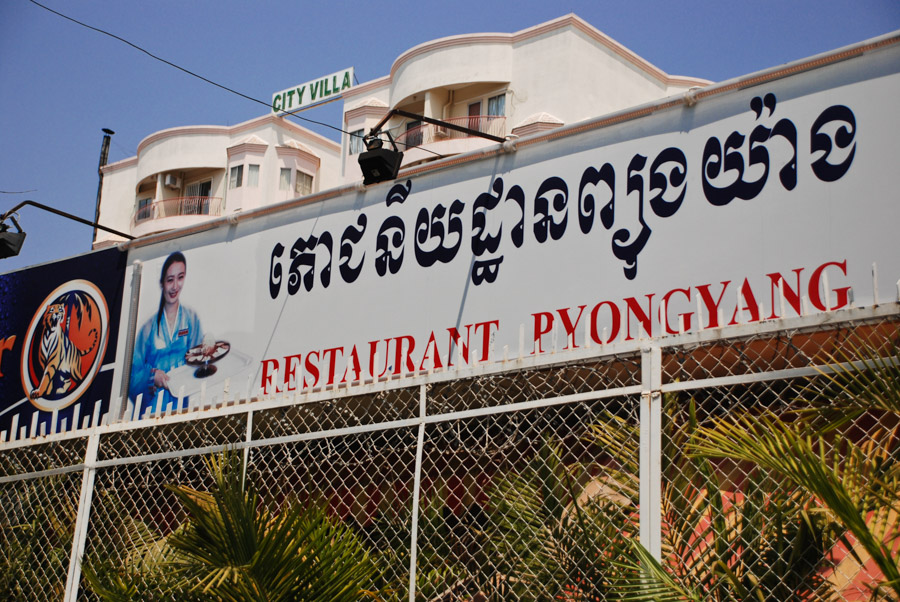The waitresses, enlisted from the DPRK elite into state service and shipped to government-run eateries across Asia, face political scrutiny and the prison-like servitude of home
PHNOM PENH, Cambodia and SEOUL, South Korea — Even at seven-thirty on a Wednesday night, the restaurant is packed to overflowing. A few minutes after being seated, a waitress glides up to the table bearing glasses and frosted bottles of Tiger beer; in a few swift motions, glasses are filled and small dishes of Korean appetisers materialize, including kimchi, Korea’s iconic spicy pickled cabbage. The young woman — her name is Kim Gyong-Hwa — wears a fluorescent pink chima jogoiri, the bell-shaped Korean national dress, with her name printed on a small tag in the colours of the North Korean flag. She is one of a dozen or so waitresses living and working at Pyongyang Restaurant in the Cambodian capital Phnom Penh, part of a continent-wide chain of restaurants that channels hard currency back to the North Korean regime.
For the predominantly South Korean clientele, waitresses like Gyong-Hwa are as much of a draw as the menu, which boasts such northern specialties as Pyongyang cold noodle and dangogi (“sweet meat” — a euphemism for dog). In the flood-lit restaurant hall, the young women perform a nightly song and dance routine as panoramas of North Korean capital Pyongyang slide past on a karaoke screen. On this particular night, the crowd clapped and cheered as Gyong-Hwa joined her colleagues in a rendition of Abba’s “Dancing Queen,” complete with electric guitar, bass, and accordion. One young woman brought a revolutionary zeal to bear on her drum kit, stopping the show with a series of thundering solos — a performance more than worthy of Dear Leader Kim Jong-Il.
The 22-year-old Gyong-Hwa, originally from Pyongyang, says she is six months into a three-year work placement in Cambodia. But she will likely see little of the country in which she works, and will return to her homeland with little knowledge of it. Like all North Koreans working abroad, she and her fellow waitresses live highly regimented lives. When asked if she had seen the famous temples of Angkor or been sight-seeing around the capital, she giggled nervously and shook her head. Where does she live? She motioned upwards, indicating the living quarters upstairs from the restaurant, before shuffling off to replenish our half-empty glasses.
Pyongyang Restaurant is one of possibly hundreds of North Korean restaurants that were set up across Asia to raise hard currency after the DPRK’s economy took a nose-dive in the mid-1990s. The lives of the women who are sent abroad to work in these establishments are secretive and encapsulate a problem facing the North Korean regime: how to bring in more foreign earnings without allowing their citizens to be “contaminated” by foreign ideas. In mid-February, as a popular uprising broke out in Libya, around 200 North Korean construction workers there were prevented from returning to their homeland. The reason, according to the Yonhap news agency, was to block news of the Arab uprisings from reaching the isolated state.
In the case of the waitresses, managing this balance requires every mechanism of control at the regime’s disposal. Experts say the waitresses are overwhelmingly drawn from the uppermost echelon of songbun, the regime’s political caste system. Kwon Eun-Kyoung, English editor of the Daily NK, a Seoul-based news organisation dedicated to reporting on the DPRK, said that those sent to work at overseas eateries are likely subject to the same degree of political screening as reserved for staff at Department No. 5 of the Central Committee of the Korean Workers Party, which coordinates Kim Jong-Il’s daily activities.
“When they select girls who are working — even just typists, or women who clean up the buildings — they always check the whole family background and loyalties, and if they are members of the party or not,” she said. “The family backgrounds mean more than three generations, up till their grandfathers.” Kwon said the waitresses posted overseas are subject to the same strictures that accompany their high-caste status within the North, which includes daily and weekly “evaluation meetings.” “It is a regular routine,” she said.
By the standards of North Korea, where debilitating poverty and widespread malnutrition make physical health a handy index of political suitability, the women at Pyongyang Restaurant are especially notable for their height. In her 2010 book Nothing to Envy: Everyday Lives in North Korea, American journalist Barbara Demick writes that residency in Pyongyang — the showcase capital — is reserved for the upper rungs of the songbun system. Northern defectors, often from famine-stricken rural areas, are of scrawny stature compared to their privileged brethren from the capital.
“They choose all the pretty girls to work there — and tall,” said Chun Ki-Won, the head of Durihana, a missionary group that helps North Korean defectors flee to the South. “The ones who I’m bringing over are all short. They’re stunted compared to the ones in the restaurant.”
As a result of their privileged backgrounds, waitresses like the fresh-faced Gyong-Hwa rarely defect, despite the relative ease with which they could escape the restaurant compounds. “These women are not defectors,” said Tim Peters, the founder of Helping Hands Korea, a Seoul-based group that aids North Korean refugees. “These are women chosen — usually from Pyongyang or one of the similar cities where more loyal subjects can be found — and they are working in concert with the government.”
Chun from Durihana said he has never helped any restaurant workers, though one woman he met while at the Phnom Penh restaurant a few years back showed an interest in South Korea. “She was only there for six months and they sent her back to North Korea again, but she was very interested,” he said, showing me a photo of the young woman, posing for a snapshot with him and a group of defectors.
Other women have reportedly succumbed to the lures of freedom. In 2006 and 2007, the Daily NK reported several incidences of restaurants in China’s Shandong and Jilin provinces being shuttered after waitresses tried to flee.
Interactions with foreign clientele can also pose political complications. In February 2009, without warning, the North Korean eateries in Cambodia and Thailand shut their doors for a six-month hiatus. At the time, Moon Young-Soo, the manager of Le Seoul Korean restaurant in central Phnom Penh, told the Phnom Penh Post that the restaurant had closed due to internal problems in the DPRK. One worker at a nearby business, who did not give his name, told the paper that the restaurant had closed after a dispute with a customer who wanted to take one of its North Korean waitresses out after dinner and created a scene.
According to another report, two or three North Korean security agents live on site at each restaurant to “regulate” the workers, and any attempts at flight result in the immediate repatriation of the entire staff. “Because they are pursuing business competitively, they have had to shut down operations one after the other due to the inability to manage internal affairs, such as employees breaking away,” Kim Myung-Ho, a North Korean defector who ran a restaurant in northern China, told the Daily NK.
Even the privileged life in North Korea, it seems, is nothing to envy. Andrei Lankov, a Korea expert based at Kookmin University in Seoul, said the families of the restaurant workers essentially “serve as hostages” to keep the waitresses loyal. Any temptation to defect is tempered by concern for relatives in the North. While it is now unusual for people to be sent to concentration camps if a relative attempts to defect, careers can still be ruined. “People are usually careful, and they don’t escape. There have been cases, but they usually don’t,” he said.
Like other North Korean migrant workers — from loggers in Siberian Russia to shoe manufacters in Poland to the stranded construction workers in Libya — these women are often left high and dry. “They’re seeking these jobs only to discover later that the regime in Pyongyang is taking the majority of the money and if they even have a medical issue or an injury while they’re overseas, that is taken from their pittance of a salary,” said Peters of Helping Hands Korea. “They often go back feeling cheated.”
Kim Gyong-Hwa has more than two years left in Phnom Penh before being sent home, an unending routine of service to the regime. For the North Korean government, fighting a rear-guard action against encroaching foreign influences, survival may mean sealing Gyong-Hwa and her co-workers ever more closely off from the world outside. Though the days will be filled with noise and people for a couple hours each night, her workplace resembles a slice of her austere homeland, excised and deposited in the middle of a Southeast Asian city full of colour, light and — for some — the temptation of freedom.
[Published on TheAtlantic.com, June 7, 2011]


